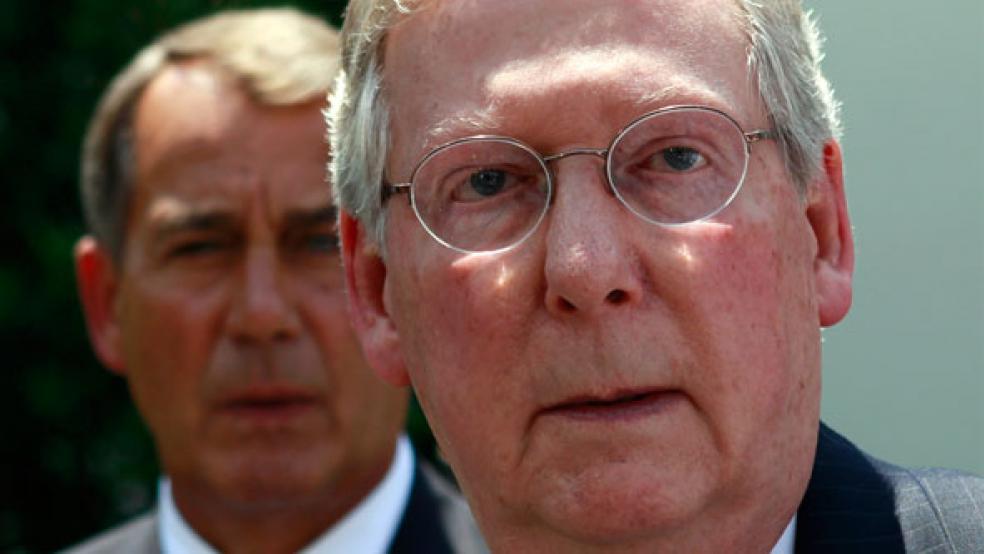By pursuing a failed government shutdown strategy, Republicans may have once again snatched defeat from the jaws of victory in next year’s battle for control of the Senate. The GOP had a better than even chance of wresting control before the 16-day shutdown and near default on U.S. debt.
Now polls show the Republican Party to be near outcasts and prospects for the Democrats much improved. Following Newark Mayor Corry Booker’s special Senate election victory in New Jersey last week, the Democrats and their two independent allies hold a 55 to 45-seat advantage over the Republicans in the Senate.
The Republicans would need a six-seat swing to wrest control of the upper chamber – which now appears increasingly daunting amid the crisis within the party.
RELATED: HOUSE GOP SUFFERS EPIC COLLAPSE IN PUBLIC SUPPORT
While Republican strategists earlier this year said they saw a likely GOP path to victory in the 2014 Senate races, political experts including University of Virginia political scientist Larry Sabato and Jennifer Duffy of Cook’s Political Report say the Democrats for now have regained the upper hand.
That’s due largely to a voter backlash against Sen. Ted Cruz of Texas and other Tea Party Republicans who helped precipitate the government shutdown and a debt ceiling crisis in hopes of blocking implementation of President Obama’s Affordable Care Act.
“Once again, the Republicans’ biggest problem is, well, Republicans,” Duffy said in an interview Monday.
Sabato said that while the election is still a year away, “The shutdown story took hold with the public, much more so than most events.”
“We can say with some confidence this will be an issue next fall,” he added. “There's no question it hurt the GOP image substantially. The shutdown and challenge to the debt limit appeared reckless, very costly, and to no good end.”
The GOP needs to pick up a net total of six seats to regain a Senate majority that was lost in 2006. But is reeling from angry responses from many Republican voters as well as Democrats for allowing Tea Party champions including Texas Sen. Ted Cruz and Utah Sen. Mike Lee to highjack the debate and force a government shutdown in a strategy that veteran Republicans repeatedly warned would not work.
CNN released a poll on Monday in which 54 percent of Americans said that a GOP majority in the House is “bad for the country,” a sentiment that would no doubt extend to putting Republicans atop the Senate.
The situation has been disastrous enough to propel Democrat Terry McAuliffe into the frontrunner spot in this year’s Virginia gubernatorial race, leading 46 percent to 38 percent, according to a recent poll by NBC News and Marist College.
Meanwhile, Tea Party members are trying to challenge establishment Republicans in their party primaries next year.
Senate Minority Leader Mitch McConnell (R-KY) helped craft the deal to end the partial shutdown and raise the debt ceiling, a move that galvanized support from primary challenger Matt Bevin, a Kentucky businessman, who last week received an endorsement from the Senate Conservatives Fund, a PAC founded by former Sen. Jim DeMint (R-S.C.) who now heads the Heritage Foundation.
The retirement of Sen. Saxby Chambliss (R-Ga.) has touched off a mad scramble within the party to succeed him, including bids by three GOP House members – Paul Broun, Phil Gingrey and Jack Kingston.
But the big question is whether the shutdown jeopardized the GOP’s chances in four states where they must beat Democrats:
Alaska: In August, Republicans were already gunning to unseat an apparently vulnerable Mark Begich.
The National Republican Senatorial Committee began a robocall campaign to reach 70,000 Alaskan households, telling residents in the oil rich state that Begich supported a carbon tax.
A recent survey by Harper polling showed that Begich is barely leading either of two possible Republican challengers, Alaska Lt. Gov. Mead Treadwell and former state natural resources director Dan Sullivan. But Begich has raised $4.8 million this cycle for his reelection campaign.
Arkansas: Sen. Mark Pryor may be the son of a legendary senator, but he's one of the most vulnerable Democrats seeking reelection in 2014. Since he skated to reelection to his second term in 2008, Pryor has seen the political landscape in his home state shift to the right.
Democrats are nervous about his chances as a resurgent Arkansas Republican Party unites behind a conservative upstart, freshman Rep. Tom Cotton. Hostility towards Obama and the Affordable Care Act runs high in the state, and Cotton is doing everything he can to closely link Pryor to the unpopular president.
The result so far has been a dead heat. A new poll released Sunday on the Senate race in Arkansas shows Cotton only one percentage point behind Pryor--42 percent to 41 percent-- with 17 percent of voters undecided, according to Talk Business Arkansas.
Louisiana: Democrat Mary Landrieu is seeking her fourth term in the Senate with an increasing degree of momentum after the shutdown.
Republican presidential nominee Mitt Romney almost garnered 58 percent of the vote last year in the Bayou State. But Landrieu appears to be leading her likely challenger, Rep. Bill Cassidy (R-LA).
Landrieu is ahead of Cassidy by 48 percent to 41 percent, Public Policy Polling said last week. The progressive firm said that 60 percent of Louisiana voters opposed the shutdown and 47 percent are “less likely” to vote for Cassidy because he supported the partial closure.
When voters learn about Cassidy’s role in the shutdown, Landrieu’s margin increases to 10 percentage points (52 percent versus 42 percent).
North Carolina: Republicans have grabbed control of the governor’s mansion and statehouse in North Carolina, but Democratic Sen. Kay Hagan’s seat currently looks to be beyond their reach.
Once again, PPP has the goods. Hagan was swept into office in 2008, when the Tarheel State also went for Obama. She holds a 47 percent to 42 percent edge over a generic Republican. Four candidates are currently vying for the GOP nomination, but the winner may face pressure to disown the shutdown because 63 percent of North Carolina voters opposed it.



